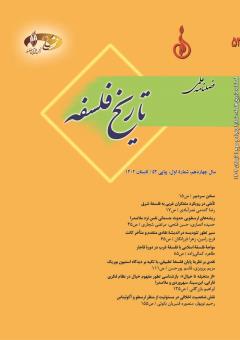نقش شخصیت اخلاقی در مسئولیت از منظر ارسطو و آکوئیناس
محورهای موضوعی : ریشهشناسی مکاتب و آراء فلسفی در ادوار قدیم و جدید
رحیم نوبهار
1
![]() ,
منصوره قنبریان بانوئی
2
,
منصوره قنبریان بانوئی
2
![]()
1 - دانشیار گروه حقوق اسلامی، دانشگاه شهید بهشتی، تهران، ایران
2 - دانشجوی دکتری حقوق کیفری و جرم¬شناسی، دانشگاه شهید بهشتی، تهران، ایران
کلید واژه: فاعل اخلاقی, مسئولیت اخلاقی, شخصیت, محرک مستقل, محرک قائم بذات, اعمال ناگهانی, ارسطو, آکوئیناس,
چکیده مقاله :
نظریۀ مسئولیت اخلاقی ارسطو بعنوان پیشگام نظریۀ اخلاق فضیلت، بدلیل توجه ویژه به منشهای اخلاقی، نگاهی نوین به مسئولیت دارد. آکوئیناس که از پیروان ارسطوست، با تأکید بر شخصیت و تمرکز بر اعمال عمدی کامل انسانی و نقش عنصر تأمل پیشینی دربارۀ عمل، خوانشی نو از مسئولیت اخلاقی ارائه داده است. در نگاه ایندو فیلسوف، فاعل اخلاقی، فاعلی است که دارای فضیلت و رذیلت شخصیت و توانایی انجام عمل عمدی کامل باشد؛ از اینرو، کودکان و حیوانات، چون فاقد چنین ظرفیتها و شخصیت اخلاقییی هستند، موضوع ارزیابیهای اخلاقی قرار نمیگیرند. بهاعتقاد ارسطو و آکوئیناس، قلمرو فاعلان اخلاقی افزون بر فاعلان شرور و فضیلتمند، شامل فاعلان خویشتندار و غیرخویشتندار نیز میشود. مقالۀ حاضر با رویکرد توصیفیـتحلیلی، به این مسئله میپردازد که از منظر ارسطو و آکوئیناس، عمل فاعل اخلاقی در چه صورتی موضوع ارزیابیهای اخلاقی قرار میگیرد؟ بر اساس یافتههای این مقاله، اعمالی که موضوع مسئولیت اخلاقی هستند، باید از روی عمد و در بستر شخصیت اخلاقی فاعل بعنوان محرکی غیرتصادفی برای عمل، انجام شوند، حتی اگر ناشی از تأمل و تصمیم نباشند، زیرا اعمال ناگهانی نیز بنوعی ناشی از منشها هستند و مصداق بارز اعمالی هستند که موضوع ارزیابیهای اخلاقی قرار میگیرند.
Aristotle’s theory of moral responsibility, as a pioneer theory of ethics of virtue, presents a new approach to responsibility because of its particular attention to moral conduct. Aquinas, a follower of Aristotle, has provided a new interpretation of moral responsibility with an emphasis on character and a focus on completely voluntary human acts and the role of apriori reflection on act. In the views of these two philosophers, moral agent is an agent who possesses knowledge, personality vice, and the ability to perform completely voluntary acts. Accordingly, children and animals are never subjected to moral evaluations because they lack such moral capacities and characters. Aristotle and Aquinas believe that the realm of moral agents, in addition to evil and virtuous people, includes restrained and non-restrained ones. Following a descriptive-analytic method, the present paper investigates the conditions under which the acts of moral agents are subjected to ethical evaluations in the views of Aristotle and Aquinas. Based on the findings of this study, those acts that become the subjects of moral responsibility must be done voluntarily based on the moral character of the agent as a non-accidental stimulus for act, even if they do not originate in deliberation and are not based on prior decision making. This is because sudden acts also originate in certain sources and function as clear references for moral evaluations.
